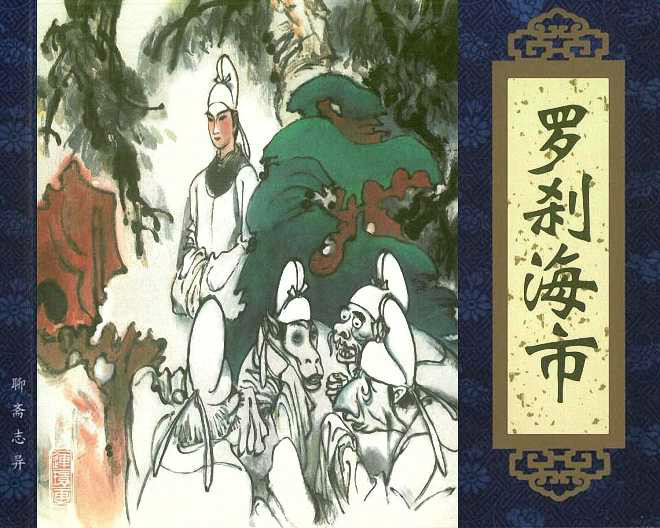The Chinese music world is abuzz with excitement as one of the new songs by renowned pop singer 刀郎 Dao Lang has taken the internet by storm. “罗刹海市 (Luo Cha Hai Shi) ” featured in Dao Lang’s latest album “山歌寥哉(Shan Ge Liao Zai),” has become a top online trending topic, prompting discussions about its significance and popularity. The song’s association with the classic works of Pu Songling and its potential satirical elements have captured the attention of music enthusiasts nationwide.
“罗刹海市 (Luo Cha Hai Shi) ” recounts the tale of a Chinese businessman named Ma Ji, who ventures into the fictional state of Luocha, located over 1,000 miles away from China. The locals in this peculiar land possess unique features like three eyes, two noses, and reversed ears, which they consider beautiful. This story finds its roots in Pu Songling’s “Strange Stories from a Chinese Studio,” known for its satirical narratives.
Many netizens have interpreted Dao Lang’s song as a satire, possibly aimed at rival singers who had once criticized his songs as “unaesthetic.” However, a music insider has dismissed these claims, asserting that Dao Lang is not the kind of person to harbor such narrow-mindedness.
Dao Lang, born in Sichuan Province in 1971, rose to fame in 2002 with his hit song “The First Snowfall in 2002.” His popularity skyrocketed as the album sold an astounding 2.7 million copies, making him a household name across the country. Despite his immense appeal among blue-collar workers and farmers, some top singers criticized his songs as “earthy” and “vulgar,” leading him to withdraw from the music scene since 2013.
Surprising the nation, Dao Lang made an unexpected comeback in July 2023 with the release of “Luo cha Hai shi.” Without any prior promotion, the song immediately gained widespread popularity on numerous Chinese music platforms. By Tuesday, it had been played billions of times and attracted millions of listeners, sparking various adaptations, including Peking Opera renditions.
Fans and fellow musicians have praised Dao Lang’s return, celebrating his singing prowess and creativity. Some fans playfully commented that they thought he had retired from singing and composing, but the song’s release proved otherwise, likening his preparation over the years to “sharpening his knife” (dao in Chinese).
The cursive version of the song’s lyrics has also fueled discussions among netizens, with some interpreting its deeper meanings and metaphorical expressions of Dao Lang’s emotions and life experiences.
Dao Lang’s unique approach of blending ancient literary themes with contemporary music has received high acclaim, reaffirming his position as one of China’s top singers. His surprise return has rekindled enthusiasm among fans and musicians alike, signaling a triumphant comeback for the enigmatic artist.
As “Luo Cha Hai Shi” continues to captivate listeners across the country, the music world eagerly anticipates more surprises from Dao Lang, reaffirming his status as a creative and talented force in the industry.
—
罗刹海市 (Luo Cha Hai Shi) background: “罗刹 Luocha” is the name of evil spirits, and “海市 Haishi” refers to a mirage or a mirage-like phenomenon known as the “海市 sea city.” “Luocha Haishi” is a classical short story written by Pu Songling, a Qing Dynasty novelist.
This work mainly narrates the story of Ma Ji and the Dragon Maiden XiaoQiao, who play the leading roles in a tale of love and intellect set in the mirage-like city of Luocha in ancient times. In the story, Ma Ji becomes disillusioned with the extravagant life of ancient China and seeks a life he has always yearned for in Luocha. XiaoQiao, on the other hand, resides within the mirage-like city and greatly admires Ma Ji’s talents. Under Pu Songling’s pen, the narrative is infused with elements of fantasy, depicting the exotic and otherworldly ambiance of the sea city and the enchanting romance between a gifted man and a beautiful woman. The story carries a tone of cynicism, with the author skillfully using Luocha as a metaphor to subtly criticize and satirize certain aspects of society.
This literary work reflects the historical and societal background of Pu Songling’s era. During the Qing Dynasty, social turmoil prevailed, and through “Luocha Haishi,” Pu Songling expresses his longing for freedom, independence, and a peaceful life. Simultaneously, the story unveils the contradictions and problems prevalent in the contemporary society.




